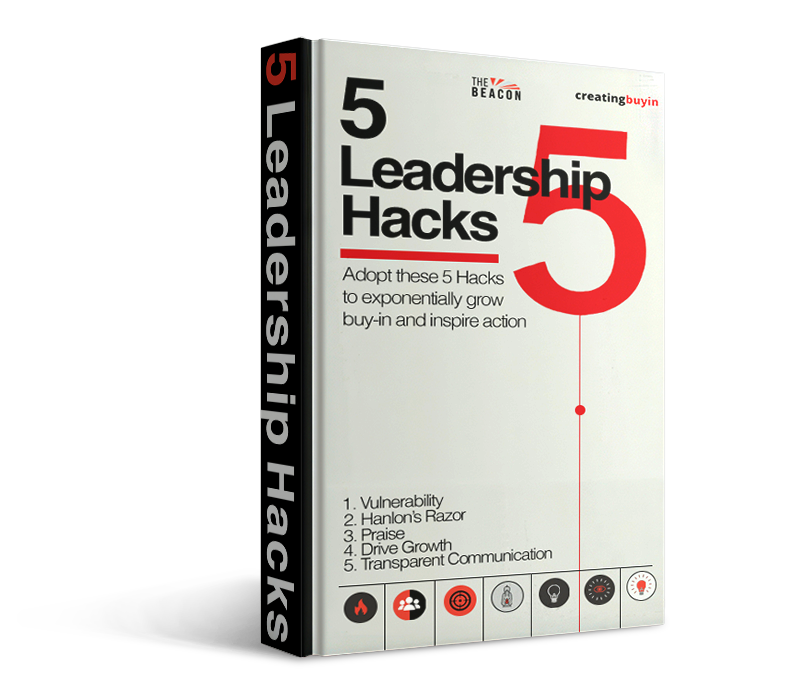Eradicating the Ego

Ego can be defined as a person’s sense of self-esteem or self importance. Leadership positions can make it incredibly easy to have a sense of position, title, and power. Too many times you can see results of this in the way people speak, treat people, and in what they say when others aren’t around. Reference the section earlier on using personal pronouns when addressing metrics, or even people, and you can see how things like this can deteriorate a team.
It is our job to get on their level, not stand above them. To fight in the trenches with them. To have them see us on their left and right hand side. Flexing our ego will do the opposite. Puffing out our chest to inflate our egos will begin to make you “the boss”. You should never be seen as this, nor should you want that. If you think different, then gaining the buy-in of the team is going to be an uphill battle for you.
“The key to successful leadership today is influence not authority”
– Kenneth Blanchard

Ego Check
 It’s not easy but having the ability of self awareness of this one personality trait’s out of control nature can spell success or catastrophic failure for many leaders and people in positions of authority. Every important facet of good management or leadership can and will be brought down with an out of control ego. Throughout time there have been arrogant generals or cocky presidents who let themselves get in their own way. It is the first step toward failure and I highly encourage you to get a hold of it before it is too late. Self awareness is one of the principles of having High EQ. Learn about EQ in the Harvard Business Review’s 10 Must Reads on the topic.
It’s not easy but having the ability of self awareness of this one personality trait’s out of control nature can spell success or catastrophic failure for many leaders and people in positions of authority. Every important facet of good management or leadership can and will be brought down with an out of control ego. Throughout time there have been arrogant generals or cocky presidents who let themselves get in their own way. It is the first step toward failure and I highly encourage you to get a hold of it before it is too late. Self awareness is one of the principles of having High EQ. Learn about EQ in the Harvard Business Review’s 10 Must Reads on the topic.
Thats all well and good, but how do you know about it and how do you fix it? The first step is taking stock of who you are, how you speak to people, and what your thoughts are. Aristotle’s famous words “know thyself” comes in handy here. This can be done in a few ways which can be challenging but worth it.
9 Ego Check Steps
1. Ask someone about yours
This is by far the easiest and will give you the biggest bang for your buck. While it’s also the path toward awareness of an out of control ego, it is also a cure for one.
2. Do you get defensive?
If someone were to disagree with you, is your first reaction to go on defense mode, or possibly on the attack? If so you’re worried about being wrong. See #8 and #9.
3. Do you speak about yourself too much?
Start to notice how much you’re speaking about yourself. Better yet, are you already queuing up what you want to say WHILE the other person is speaking? Is what you’re about to say going to “one up” what the other person is saying?
4. Do you use the words “my” or “me” when referring to department numbers, teammates, or accolades?
We dove pretty deep into this one in our “This one word is killing your team and your buy-in” article.
5. Do you ask for feedback from co-workers?
If you’re afraid to ask this it’s because you’re probably on this list. Asking a teammate for guidance is the best way to make someone else feel important, included, and that their opinion matters.
6. Do you ask for feedback from anyone you’re in charge of coaching?
Yes we’ll say it again. Asking not only from colleagues but direct reports or people you’re in charge of coaching is immensely important in ego dissolution and team building.
7. Do you play the blame game?
Taking responsibility for the outcomes of all things good and bad is a true sign of leadership. Jocko Willink and Leif Babin’s Extreme Ownership is directly related to owning up to the success and failure (failures more importantly) of the group. Even if you may not have been directly involved, if it is a failure under your watch, it’s your fault.
8. Is being right more important than being wrong?
This is straight out of Ray Dalio’s Principles but, think about it. Are you more willing to fight to the death about something you feel you’re right about rather than finding out what the truth is? In other words, are you ok with admitting that you could be wrong about something in light of new facts on the topic?
9. Are you willing to be vulnerable in front of coworkers?
This plays on numbers 5 and 6 but being ok with not being ok, or correct, is a big step in allowing people to see that you’re human. Admitting having weaknesses or being wrong about something allows others to adopt that mindset and be more truthful. Now you can work alongside each other rather from the top down approach.
This last one mentions the true enemy of ego. Vulnerability. We dove into this concept in Building Trust, but it is very important so we’ll repeat it time and time again. How does something like being vulnerable have a place in a work or coaching environment? Understand that showing a vulnerable side to yourself (i.e. admitting weaknesses or not knowing how to do something) helps you pull down the walls that either you’ve created, or are organically there as a result of your position. So it is possible you didn’t intentionally create these walls and your title is to blame; nevertheless, an out of control ego will reinforce these walls between you and the team and constantly pull you apart from them everyday.

Eradicating Team Ego
Eradicating personal ego with self-awareness and vulnerability is the first step but what do we mean by walls? We’ll dive deep into that topic at another time but for now we need to realize that ego can create a separation between the team and itself and even the team and you. It’s possible you put those walls there yourself with an out of control ego and that became an example for others. So how do we fix it in the team? No question, the team certainly has ego. What we need to do here be sure the group can adopt vulnerability and even humility as a way of being. Not so much as to ruin its self worth but to understand that no body knows everything.
“None of us is as smart as all of us”
– Kenneth Blanchard

 The best way I’ve seen this done is to be sure the team is constantly learning about their craft. (Side note: we do have to get them to care first). This can be anything from learning new techniques in sports to learning new ways of doing any of the things they currently think they’re great at. “If you’re not growing anywhere, you’re not going anywhere” is a great quote from the book Legacy about the New Zealand All Blacks.
The best way I’ve seen this done is to be sure the team is constantly learning about their craft. (Side note: we do have to get them to care first). This can be anything from learning new techniques in sports to learning new ways of doing any of the things they currently think they’re great at. “If you’re not growing anywhere, you’re not going anywhere” is a great quote from the book Legacy about the New Zealand All Blacks.
IF YOU'RE NOT READING, YOU'RE BEHIND
When groups begin to open up their minds and learn new ways of doing things, they begin to realize how much they DON’T know. Humility naturally occurs here because “the more you know, the more you know you don’t know”. If you have a staff or team meeting, there should almost always be a lesson. It can be anything really. Anything to keep them interested in being better at what they do (this is literally your job as their leader/coach/manager – to make them better). It can be as easy as bringing in an article on a topic and discussing it. If you have this set in place and people are learning enough and you are consistent with your approach, you can now encourage the team run it’s own education workshops to teach each other. Not only will that help to eradicate ego, it will also pull the team together.
There is always time for education and one could argue that creating an environment of education may be one of the most important things to focus on with the group. There is always something to be learned.
Ego is always going to be a problem, but it is up to us to set the example to the team that: we don’t know everything and you don’t know everything. Together lets share ideas on how to be better and figure things out



